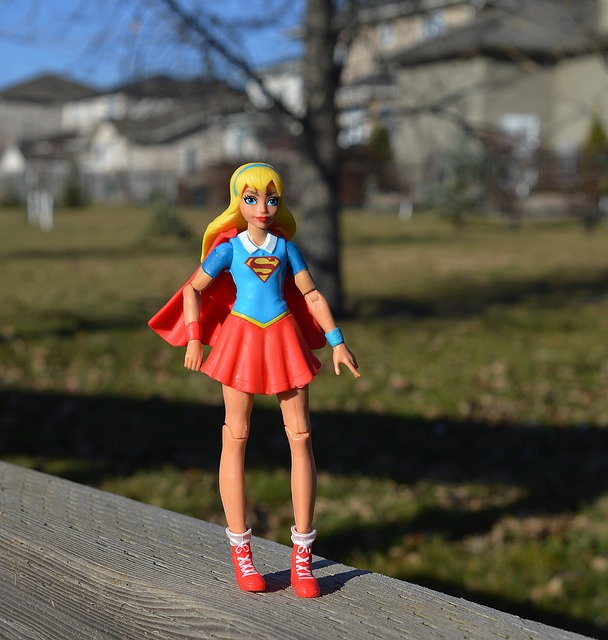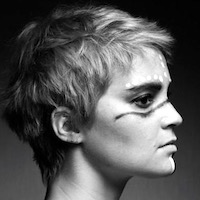When I was a child, I didn’t think of myself as a boy or a girl.
I mean, when someone asked, sure—I’d tell them I was a girl. (Which happened more than you might think—I had really short hair for a while. Yep, a trendsetter, this one.)
But in my day-to-day life, I never really thought about it. It had no bearing on me. It didn’t affect my playing outside with the dogs. It didn’t influence who I hung out with. It certainly didn’t make me act more “feminine.”
When I hit that awkward stage around puberty, though, everything seemed to change. Suddenly, not only did being male or female really matter, but “masculinity” and “femininity” did too.
I remember trading in shorts and t-shirts for tight skirts, short tops, and platform shoes. Yes, this is what a lot of girls were wearing in the late ’90s. For a while, I stopped being my true self, because I was so confused by this idea of femininity. I was socialized—mostly through school and the media, at that time—to believe that being female meant you should be feminine, or at least what we understood feminine to mean.
There was no discrimination between sex and gender identity at the time. At least not for 13-year-olds in Westlake.
Being feminine meant wearing sexy clothes, makeup, getting your hair done, even playing certain sports and avoiding others.
Thankfully, this phase of trying-to-figure-out-just-what-the-hell-gender-identity-is-all-about didn’t last that long for me, and soon, I embraced both the “feminine”and “masculine” sides of myself. But it wasn’t until last year, as a matter of fact, that I realized I didn’t consider myself a woman or a man, and that, despite my years of thinking to the contrary, I was not a feminist at all.
Before you stop reading and light your computer on fire or something, let me explain. I am a female-ist.
I support anyone who identifies as a woman or was born a female, men who support women, males who support females, transpeople. I just love people, okay? It feels so ridiculous to me that anyone could not support any and everyone.
So, when I say I am not a feminist, it is not a description of my beliefs or actions—but a gripe with the words themselves.
“Feminist.”
“Feminine.”
This is why I say the future is undoubtedly female, but I hope it’s not feminine. Not because I have any qualms with anyone being themselves in any way they want to be. If you want to get your hair done, do your nails, dance ballet, watch rom coms—do it! Absolutely do it. I do this stuff all the time.
But, I don’t like that we call these things “feminine.”
These are just things that some humans like to do. And, by labeling certain actions or attributes as “masculine” or “feminine,” I honestly think we are holding ourselves back.
The way we use the word “masculine” in our culture tends to mean a few things: powerful, strong, sharply edged, pushy, stubborn, hard-working, emotionless at times, logical, not particularly nurturing.
The way we use the word “feminine” usually means: soft, quieter, more sensual, timid at times, emotional, nurturing, caring, loving.
When we use words that relate to gender identity to describe these traits, we’re holding up age-old stereotypes for both men and women, not to mention what we’re doing for everyone who doesn’t fall within the binary gender paradigm at all.
The truth is these are human traits—whether male, female, transgender, or elsewhere on the spectrum. And, as much as we are still operating under the false belief that some of these traits are seen more in men and others more in women, I think we can trace a lot of that back to the simple use of language.
If we were to change the language, would we change the way we see men, women, and gender non-conforming people? Could we change the way men and women, at least, “traditionally” behave?
I think so.
Just check this out: in Chinese philosophy, yin and yang describe how “opposite” forces may actually be complementary, and in fact, interdependent. They’re talking about non-duality. Think expansion and contraction.
We can see the principles of yin and yang all over the world—the universe!—and this, of course, includes within humans. We expand, we contract.
It is only in our translation of this philosophy that we have taken “yin” to mean “feminine,” and “yang” to mean “masculine,” and for the two to be seen as opposite ends of a scale, rather than part of a whole. This is doing us a disservice. It’s normalizing “masculine” traits for men on one side and—as progressive as we think we are—making it harder for males to be embrace their “feminine” traits. And vice versa.
So yes, I do have a strong belief that the future will be largely influenced by females, and humans that identify as women, and probably even a whole bunch of yin energy, broadly speaking.
But I hope that, by that time, we’ll have come up with a better word than “feminine” to describe these traits; one that leaves no one feeling left out, unaccounted for, or uncomfortable.
Any suggestions?
~
Relephant read:
9 Ways to Support our Gender Non-Conforming Children & Friends.
~
Author: Natalie Grigson
Image: Pixabay
Editor: Khara-Jade Warren
Copy Editor: Leah Sugerman
Social Editor:







Read 0 comments and reply